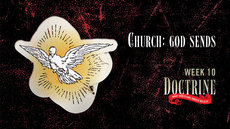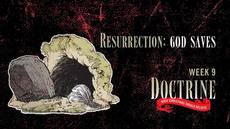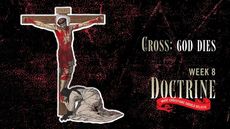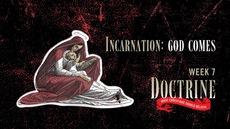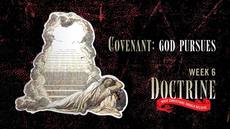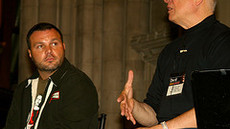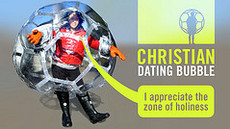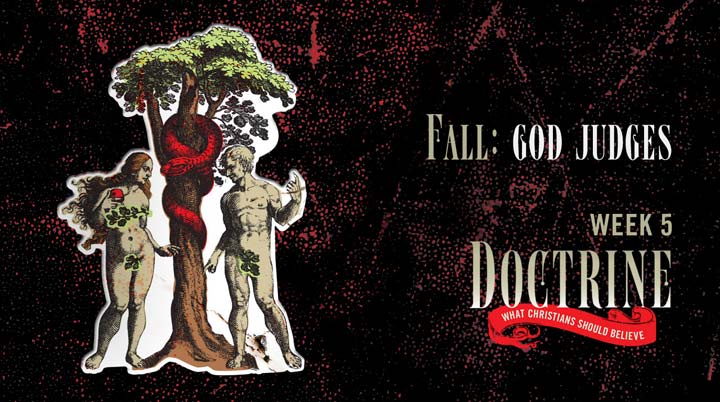
This week (Sunday, April 27) I preached the sermon Fall: God Judges as part of the Doctrine: What Christians Should Believe sermon series.
Before examining the fateful day that forever altered the course of human history in Genesis 3, we must first examine that which preceded it. In Genesis 1–2 and related biblical texts we have learned a great deal about God through the doctrines of Trinity, Revelation, Creation, and Image. We have learned that God is our Creator, and that we and all of the rest of creation are dependant upon him. In making humanity and everything else originally "very good," we saw that God is holy and altogether good. In learning that God made us male and female in his image and likeness, we witnessed the loving and kind nature of God. In seeing God make creation for us and then attentively prepare it (including a beautiful garden) for human occupancy, we saw the humility of God to serve us. In seeing God speak to mankind, we saw that God is personal and initiated a relationship of love and communication with us. In blessing creation and our first parents, we saw the generous nature of our gracious God. In sum, God is perfectly perfect. Subsequently, the human rebellion against God that began with the first sin is altogether foolish, tragic, and mad. As we study the doctrine of the fall this week, it is incredibly important that we see things, as much as possible, from the vantage point of God so as to sympathize with him over and above sinners, including ourselves. Simply put, what would you do if you were God and were treated as he has been?
Where did sin originate?
Genesis 3 is one of the most important chapters in the entire Bible because it explains the source of and solution for sin and death. The scene is the beautiful and perfect garden made by God for our first parents to live in together without sin and its many effects. There God lovingly and graciously speaks as a Father to Adam and Eve, giving them complete freedom to enjoy all of creation except the tree of the knowledge of good and evil, which was forbidden.The entrance of the Serpent marks the beginning of chaos in creation. The Serpent is Satan according to Revelation 12:9 and 20:2. Satan began by tempting Eve to mistrust God’s Word by changing its meaning, just as he did when likewise tempting Jesus in Matthew 4:1–11. Rather than rebuking Satan, Eve entertained his lies (John 8:42–47) and was subsequently deceived by his crafty arguments (2 Cor. 11:3; 1 Tim. 2:14). Satan was so bold as to accuse God of being a liar and tempted the pride of Adam and Eve by declaring that if they disobeyed God they could in effect become his peer and gods themselves. Eve believed Satan over God and chose pride over humility by partaking of the tree of the knowledge of good and evil in sin against God.
Tragically, we further read that while all of this occurred Adam stood by silently, failing to lead his family in godliness. Adam then joined his wife in sin, which brought shame, distrust, and separation between Adam and Eve, and between our first parents and God. Adam was the representative and father of all mankind, and when he sinned and fell out of favor with God so did every person who would ever live (Rom. 5:12; 1 Cor. 15:21–22). Consequently, every person since Adam and Eve, other than Jesus, is a sinner, both by nature and choice (Pss. 51:5; 58:3; Isa. 53:6; 64:6; Rom. 3:23; 1 John 1:18).
God then came looking for the man, holding him responsible for the sinful condition of his family as its head. Rather than repenting of his sin, Adam essentially argued with God by blaming Eve for his sin, and blaming God for making Eve. Eve, too, failed to repent of her sin and blamed the Serpent for deceiving her.
God then cursed the parties involved as penalty for their sin. The serpent was cursed for what he had done and was told he would be defeated one day by the "seed" of the woman, who is Jesus according to Galatians 3:16. Theologians have long called the promise of Jesus in Genesis 3:15 the protoevangelion (first gospel), as God preaches the gospel for the first time, whereas his angel will the last time (Rev. 14:6).
The woman was given increased pain in childbirth and God notes that she will struggle with the feminist tendency to rule over her husband rather than submit to his leadership as God intended (note that the language here for Eve’s desire to rule over Adam sinfully is the same as sin’s desire to rule over Cain in Genesis 4:7). The man’s work became toil for him because God cursed the ground. This means that as men seek to work their jobs and pay their bills, they will continually be as frustrated with that which is supposed to be under their dominion as God is with the rebellious man who is likewise supposed to be under his dominion. Adam was then given the privilege of naming his wife as he did the animals, and he called her Eve, which means "life-giver."
God then dealt graciously and kindly with the man and woman though they had sinned. God lovingly clothed Adam and Eve to protect them. God also banished the couple from the tree of life otherwise they would have lived forever in sin with no hope of redemption.
Today, though we still bear the image of God, it is marred and twisted by our pride and sin, which accounts for the tragedies and evils in the world that proceed from us. Our only hope is redemption through Jesus who was God and became a man to live without sin in our place, die in our place, and rise as the pattern for our future, when one day the seed of rebellion in us from Adam will be forever removed as we re-enter the second Eden in the new creation that will exceed that place in which Adam and Eve enjoyed perfect communion with God.
What is sin?
God created this world in a perfect state and upon the creation of the man and woman God declared his entire creation "very good" (Gen. 1:31). This intended state of perfect beauty in all things is described in the Old Testament as "Shalom" (Isa. 2:2–4; 11:1–9; 32:14–20; 43:1–12; 60:1–22; 65:17–25; Joel 2:24–29; 3:17–18). Surveying the condition of our planet and human life (including death, suffering, injustice, boredom, annoyances, miseries, fears, illness, pain, sorrow, grief, despair, nuisances, tragedies, etc.), it is obvious that something has gone terribly wrong. All of the individual and corporate shortcomings of God’s perfect intentions for all of creation qualify as sin itself, and/or the effects of sin.Ecclesiastes 7:29 says it well, "God made man upright, but they have sought out many schemes."
Sin includes both omission (where we do not do what we ought) and commission (where we do what we ought not do). Sin includes our thoughts, words, deeds, and motives. Sin includes godlessness, which is ignoring God and living as if there were no God, or as if one were God. Sin is invariably idolatry, which is the replacing of God with something or someone else—most often oneself. Sin includes individuals, communities, networks, and the like as individuals labor together for the cause of sin. Sin includes entire ways of thinking and acting such as racism and pornography. Sometimes a sin is also a crime, such as murder, and sometimes it is not, such as adultery. Sin can be done deliberately or in ignorance. The practice of a particular sin can occur once, regularly, or even frequently. Sin includes the breaking of God’s laws, just human laws, godly authority such as parents or pastors, and the violation of one’s own Spirit-led conscience. Sin includes perversion, which is using good things for evil purposes. Sin includes pollution, which is infecting good things with evil. Lastly, sin is the turning of a good thing (e.g., sex, work, money, comfort) into an ultimate thing so that it is worshiped as a god in place of God.
The Bible uses a constellation of images to explain sin: rebellion, folly, self-abuse, madness, treason, death, hatred, spiritual adultery, missing the mark, wandering from the path, idolatry, insanity, irrationality, pride, selfishness, blindness, deafness, a hard heart, a stiff neck, delusion, unreasonable, and self-worship.
How does Adam’s sin affect me personally?
Adam was both our father and representative. Subsequently, his sin affects us all. This includes inheriting a sin nature that leads to our sins as part of our corrupted nature that begins in our mother’s womb (Pss. 51:5; 58:3). As a result we are by nature children of wrath (Eph. 2:3), all sinners (Rom. 5:12, 19), and destined to death (1 Cor. 15:21–22). The key New Testament text on this point is Romans 5:12–21. There Paul contrasts two categories of humanity—those who are under Adam in sin and those who are under Jesus in salvation. Paul’s point is that through Adam we die and through Jesus we live, through Adam we inherit damnation and through Jesus we inherit salvation, and through Adam we inherit guilt and through Jesus we inherit grace. Everyone is under Adam by birth or under Jesus by new birth.
What is total depravity?
Utter depravity is the erroneous belief that fallen human beings are as sinful as they possibly could be and in essence are no longer God’s image bearers but rather something more akin to an animal or a demon. Despite the fact we are sinners, the Bible repeatedly states that after the Fall we do retain the image of God (Gen. 5:1–3; 9:6; 1 Cor. 11:7; James 3:9). Included in this is a vestige of moral sense because of the conscience that God has given us as his image bearers (Rom. 2:14–15). Because people are made in God’s image with a conscience, the Bible does speak of some non-Christians who, while not holy and living to God’s glory, do some "good" things. Examples would include Abimelech (Genesis 20), Balaam (Numbers 22–24), Rahab (Joshua 2), Artaxerxes (Ezra 7; Nehemiah 2), and the Good Samaritan (Luke 10:30–37). While people are not absolutely sinful (they could do evil things with greater degree and frequency), all people are totally depraved in that their every motive, word, deed, and thought is affected, stained, and marred by sin. This includes the mind (Eph. 4:18), the will (Rom. 6:16–17), the emotions (Titus 3:3), and the physical body (Rom. 8:10). The totality of a person is affected by sin and there is no aspect of their being that is not negatively impacted by sin.
How does God respond to sin?
Like a loving Father, God warned our first parents of the consequences of sin. Nonetheless, they and we have each chosen to sin against God. Because God is holy, he must deal with our sin, but because he is loving, he has chosen to do so in a way so that we could be forgiven and restored to right relationship with him. In so doing, God is honoring us by showing that we are made for more than sin and he expects more from us. A theologian named Plantinga has said that we should learn from God’s example: "We ought to pay evil doers, including ourselves, the 'intolerable compliment' of taking them seriously as moral agents, of holding them accountable for their wrongdoing. This is a mark of our respect for their dignity and weight as human beings" (Not The Way It's Supposed to Be, 66).In Genesis 3:15 God preached the first gospel to our first parents and promised the coming of Jesus, who would be harmed by Satan but would ultimately crush him and bring salvation to sinners. God then cast our first parents out of the Garden in love so that they would not live forever in a state of sin. Later in the storyline of the Bible we learn that Jesus did in fact come to save people from their sins, as Matthew 1:21 says. He did this by becoming the one who succeeded where the first Adam failed (1 Cor. 15:45). He died in our place for our sins and rose for our salvation. Amazingly, God not only judged sin in righteousness, but also bore its penalty himself as an act of love. He offers forgiveness and reconciliation by grace even though he is the offended person against whom we have all sinned. In so doing, he remains perfectly perfect and we are more wicked than we ever feared yet more loved than we ever hoped.
For Further Study
Plantinga, Jr., Cornelius. Not the Way It’s Supposed to Be: A Breviary of Sin. Grand Rapids, MI: Wm. B. Eerdmans Publishing Co., 1995.
Blocher, Henri. Original Sin: Illuminating the Riddle. Grand Rapids, MI: Wm. B. Eerdmans Publishing Co., 1999.
